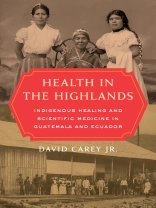Populated by
curanderos, midwives, bonesetters, witches, doctors, nurses, and the indigenous people they served, this nuanced history demonstrates how cultural and political history, misogyny, racism, and racialization influence public health. In the first half of the twentieth century, the governments of Ecuador and Guatemala sought to spread scientific medicine to their populaces, working to prevent and treat malaria, typhus, and typhoid; to boost infant and maternal well-being; and to improve overall health.
Drawing on extensive, original archival research, David Carey Jr. shows that highland indigenous populations in the two countries tended to embrace a syncretic approach to health, combining traditional and new practices. At times, both governments encouraged—or at least allowed—such a synthesis: even what they saw as ‘nonscientific’ care was better than none. Yet both, especially Guatemala’s, also wrote off indigenous lifeways and practices with both explicit and implicit racism, going so far as to criminalize native medical providers and to experiment on indigenous people without their consent. Both nations had authoritarian rule, but Guatemala’s was outright dictatorial, tending to treat both women and indigenous people as subjects to be controlled and policed. Ecuador, on the other hand, advanced a more pluralistic vision of national unity, and had somewhat better outcomes as a result.
Содержание
CONTENTS
List of Illustrations
Foreword
Jeremy A. Greene
Acknowledgments
A Note on Sources, Methodology, and Evidence
Abbreviations
Introduction: Disease, Healing, and Medicine in Indigenous Highlands
1 • Hookworm, Histories, and Health: Indigenous Healing, State Building, and Rockefeller Representatives
2 • Curses and Cures: Empíricos, Indigeneity, and Scientific Medicine
3 • Engendering Infant Mortality and Public Health: Midwifery, Obstetrics, and Ethnicity
4 • “Malnourished, Scrawny, Emaciated Indios”: Perceptions of Indigeneity, Illness, and Healing
5 • Infectious Indígenas: The Ethnicity of Highland Diseases
6 • “Prisoners of Malaria”: A Lowland Disease in the Mountains
Conclusion: Indigeneity, Racist Thought, and Modern Medicine
Notes
Bibliography
Index
Об авторе
David Carey Jr. holds the Doehler Chair in History at Loyola University Maryland and is author of I Ask for Justice: Maya Women, Dictators, and Crime in Guatemala, 1898–1944 and Oral History in Latin America: Unlocking the Spoken Archive, among other books.












